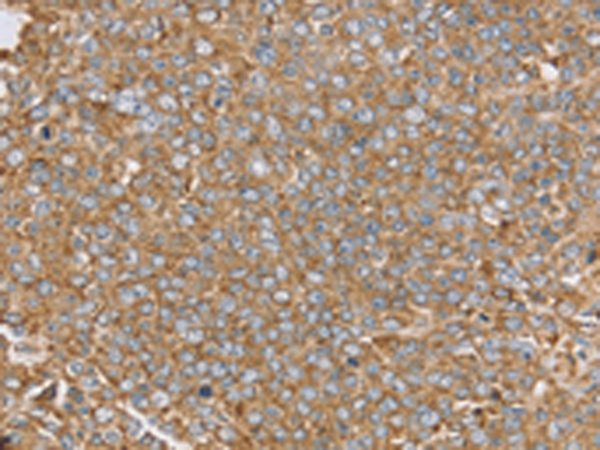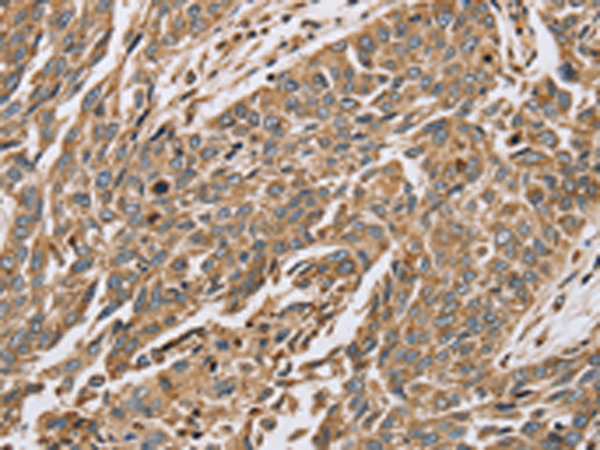


| WB | 咨询技术 | Human,Mouse,Rat |
| IF | 咨询技术 | Human,Mouse,Rat |
| IHC | 1/50-1/200 | Human,Mouse,Rat |
| ICC | 技术咨询 | Human,Mouse,Rat |
| FCM | 咨询技术 | Human,Mouse,Rat |
| Elisa | 1/2000-1/5000 | Human,Mouse,Rat |
| Aliases | EP2 |
| WB Predicted band size | 40 kDa |
| Host/Isotype | Rabbit IgG |
| Antibody Type | Primary antibody |
| Storage | Store at 4°C short term. Aliquot and store at -20°C long term. Avoid freeze/thaw cycles. |
| Species Reactivity | Human, Mouse |
| Immunogen | Synthetic peptide of human PTGER2 |
| Formulation | Purified antibody in PBS with 0.05% sodium azide and 50% glycerol. |
+ +
以下是3篇与PTGER2抗体相关的文献及其摘要概括:
1. **文献名称**:*Prostaglandin E2 Receptor EP2 Antagonism Reduces Neuroinflammation and Axonal Damage in a Mouse Model of Cerebral Malaria*
**作者**:S. A. Combes et al.
**摘要**:该研究利用特异性PTGER2(EP2)抗体在小鼠脑疟模型中验证了EP2受体的促炎作用,表明抑制EP2可减少神经炎症和轴突损伤,提示其作为治疗靶点的潜力。
2. **文献名称**:*EP2 Receptor Signaling Mediates TNF-α-Induced Inflammation in Colonic Epithelial Cells*
**作者**:J. Li et al.
**摘要**:通过Western blot和免疫荧光技术结合PTGER2抗体,研究发现EP2受体在结肠炎中通过增强TNF-α信号通路促进炎症反应,为炎症性肠病治疗提供了新方向。
3. **文献名称**:*Prostaglandin E2 Receptor EP2-Specific Antibody Attenuates Osteoarthritis Progression in a Rat Model*
**作者**:K. M. Kobayashi et al.
**摘要**:该文献报道了一种靶向PTGER2的单克隆抗体在骨关节炎大鼠模型中的应用,结果显示其能抑制关节软骨降解并降低炎症因子表达,证实EP2抗体具有治疗潜力。
4. **文献名称**:*Expression Profiling of PTGER2 in Human Glioblastoma Using Immunohistochemistry*
**作者**:R. T. Nguyen et al.
**摘要**:研究利用PTGER2特异性抗体分析胶质母细胞瘤组织,发现EP2受体高表达与肿瘤侵袭性和患者生存率低相关,提示其可作为预后标志物。
以上文献均涉及PTGER2抗体在疾病机制研究或治疗干预中的应用,涵盖神经炎症、肠道疾病、骨关节病及肿瘤领域。
PTGER2 (Prostaglandin E Receptor 2) is a G protein-coupled receptor that binds prostaglandin E2 (PGE2), a lipid mediator involved in inflammation, pain perception, and fever. It plays a key role in modulating immune responses, vascular function, and tissue homeostasis by activating intracellular signaling pathways like cAMP and calcium mobilization. PTGER2 is expressed in various tissues, including the immune system, gastrointestinal tract, and reproductive organs, and is implicated in pathologies such as cancer progression, cardiovascular diseases, and chronic inflammatory conditions (e.g., arthritis, colitis).
PTGER2 antibodies are essential tools for studying receptor expression, localization, and function. They are widely used in techniques like Western blotting, immunohistochemistry (IHC), and flow cytometry to quantify PTGER2 levels in cell lines, tissues, or biofluids. These antibodies aid in exploring PTGER2's role in disease mechanisms, drug-target interactions, and signaling crosstalk. Monoclonal antibodies are often preferred for specificity, while polyclonal versions may offer broader epitope recognition. Validation via knockout/knockdown models or blocking assays is critical to ensure reliability.
Research applications include investigating PTGER2's dual pro- and anti-inflammatory effects, its contribution to tumor microenvironment regulation, and its potential as a therapeutic target. Commercial PTGER2 antibodies are typically raised in hosts like rabbits or mice, with species reactivity spanning humans, mice, and rats. Their development supports both basic research and preclinical studies aiming to modulate PGE2 pathways for therapeutic benefit.
×